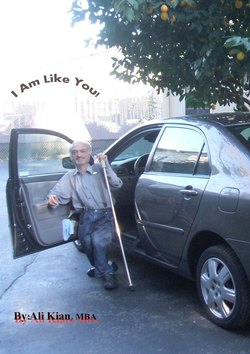Читать книгу I Am Like You! - Ali PhD Kian - Страница 3
На сайте Литреса книга снята с продажи.
In the Beginning:
ОглавлениеMy father grew up, poor and hungry, in the village of Asekan, Iran. He had six brothers and three sisters. Tehran, the capital of Iran, was 135 miles from Asekan. The trip to Tehran was arduous. The first 35 miles of the journey could only be undertaken by walking or traveling via mule, on a dirt road. The final 100 miles of the trip required catching a bus that ran on an unpredictable schedule. If the bus were missed the only option left was to hope some kind stranger might offer a ride in whatever broken down car or truck was available.
It was a difficult time for the people of Iran, particularly for those of my father’s generation. The Shah of Iran ruled the country. He and his family lived on the millions of dollars received for the peoples’ oil. While the Royal Family lived extravagant lives and dined on caviar taken from the Caspian Sea the people of my father’s village struggled to put food on their tables.
My dad was only 14 years old when he secured his first job, serving as a housekeeper for the wealthy families of Tehran. In order to save money on food (and often out of necessity), father would resort to eating leftover bread and rice from the homes of the privileged. With the meager salary my father received, he would return to his village and purchase rice, flour, and sugar for his family. In the winter, what was left of the money after buying food was used to acquire petroleum for heating and lighting. Eventually father began working as a janitor cleaning the inside of Tehran bus stations.
My dad in his army uniform as a solider at age 18
The people of Asekan would oftentimes supplement their meager food supply with wild berries, sour apples, or the walnuts they would gather from three giant walnut trees that stood near the village. My father took it upon himself to gather cuttings (young branches) from the apple and cherry trees of Tehran and return with them to his village, carrying the stems on his back. And always the last 35 miles of his journey was traveled by walking or mule. Once home, father would distribute the plant stems to the villagers. Over time, trees began to sprout on the small farms near the village, providing more food for the people. What began as an offering to help families in need became an ongoing passion that my father continued for the rest of his life.
My father’s name was Ali Omran Kian. At the age of 24, Ali Omran was introduced to Farkhondeh, a beautiful young woman from the nearby village of Gateh Deh. Gateh Deh (which translated means “big village”) was approximately a two-hour walk from Asekan. The “big village” was populated by more than 500 families; however, the roads surrounding Gateh Deh were every bit as primitive as the pathways of Asekan.
As was the custom of the time, my father was introduced to my mother as a candidate for marriage. In the Muslim society of my father’s time, there was little or no courtship. So, at the age of 15, Farkhondeh met and married 24 year old Ali Omran. By Western standards, my parent’s marriage would be considered unorthodox, but it was a union that grew into a relationship of genuine love and affection.
Compared to Asekan and Gateh Deh the village of Jostan (translated to English means “Land of Walnut Trees”) would be considered modern. Collectively, these villages totaling about ninety villages make the providence of Taleghan. Most people in Taleghan were self-educated prior to any roads connected to any cities or schools by reading Koran from one generation to another until roads connected them to more advanced schools and now they are some of the most educated people in Iran. The roads of Jostan were paved and its citizens relished looking down upon, and taking advantage of, their neighbors from my mother and father’s villages. Whenever someone from Asekan or Gateh Deh arrived in Jostan, they were often forced to wait for hours in order to catch some form of transportation to Tehran or perhaps the nearest health clinic. As the people from the smaller villages waited in bus stations or teahouses, they were subjected to insults and humiliation. It was also a common practice for the proprietors of Jostan establishments to overcharge the “primitive” villagers. For seven years, my father endured the humiliating trips through Jostan on his way to work in Tehran, but he vowed to improve the lot of his family.
The first step on Ali Omron’s journey to a better life involved moving with Farkhondeh to Tehran. At the time of their move to the city, my father still worked for the regional transit service. With few friends and no family in Tehran, it was a lonely existence for my mother and father. Ali Omron’s pay consisted of a percentage of the coins he received as bus fare. As a means of staving off boredom and loneliness, Farkhondeh occupied herself by counting the coins my father received from each day’s work. She remained up late into the night, diligently stacking coins as she waited for her husband to return home.
